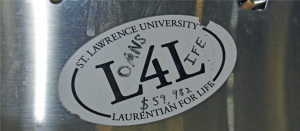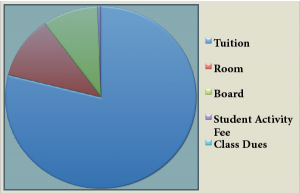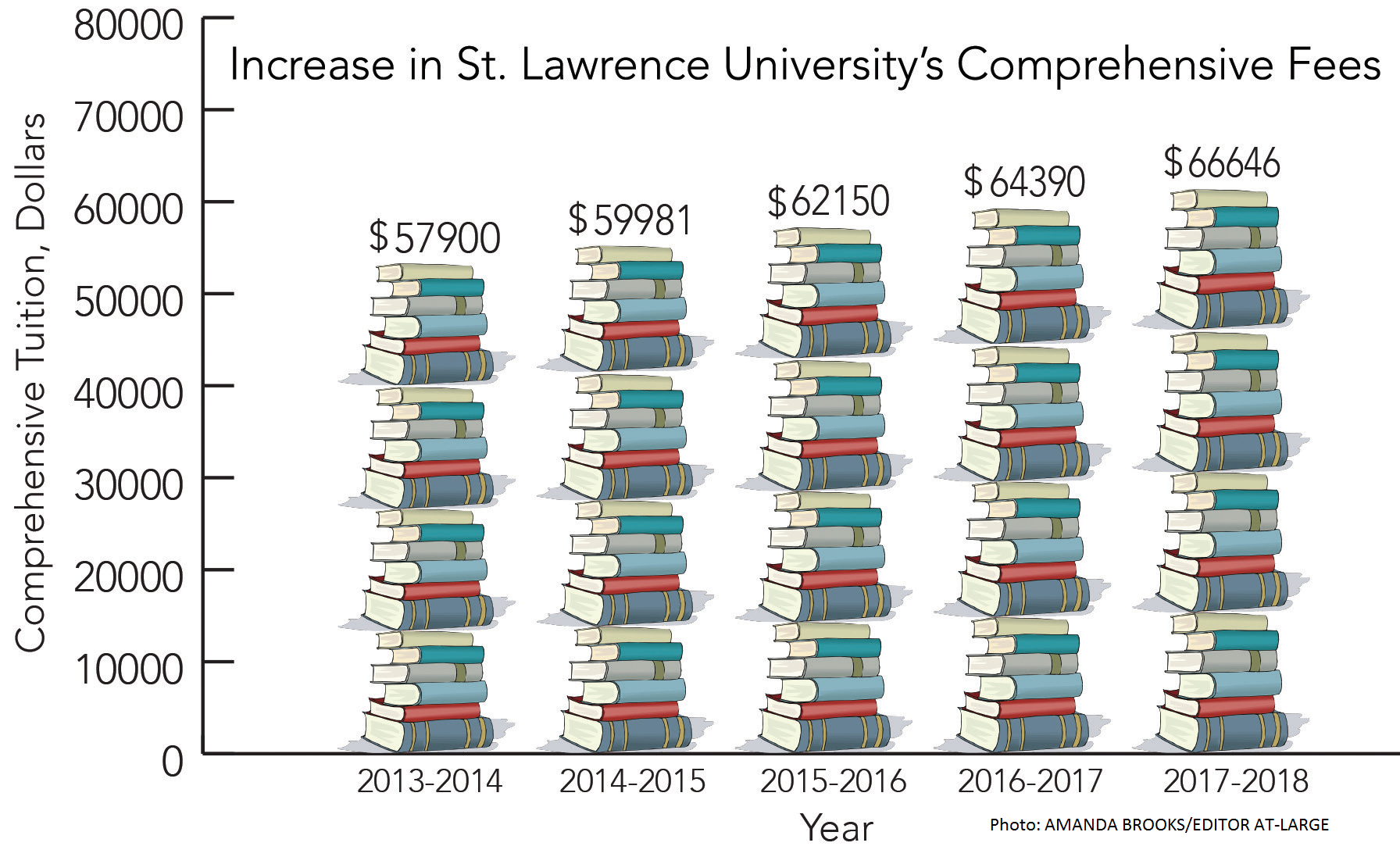In order to best communicate information about the recent tuition increase on campus, The Hill News Editorial Board decided to highlight four areas of information: from President Fox, from the Finance Office, from the Financial Aid Office, and the impact of Governer Andrew Cuomo’s proposed NYS tuition plan. The following article was written as a combined effort of
NEWS EDITORS BRENDA WINN and EMERY YOUNGER, CHIEF COPY EDITOR CLAIRE MENDES, and STAFF WRITER KATE ANGUS.
Following last week’s Board of Trustees meeting, St. Lawrence students were informed that the University’s comprehensive fee for the 2017-18 academic year would be increased by 3.5 percent. This news should come as little surprise to students, as tuition has increased by the same rate for the past two years. The new comprehensive fee of $66,646, however, is no small amount for students to pay. Divided over the academic year, this is roughly $240 per day. This week, The Hill News reached out to various University departments for comment to further understand the many factors that have led to this $2,256 rise and how this rise compares to tuition prices at similar institutions.
Since the letter announcing the fee change was sent to families and students, President Fox said that he was heard no direct comments from students, and only one parent who wrote with some questions. “Generally,” he said, “I think it’s been well-received and well-understood; it’s nice when the rationale is made fairly clear.” President Fox said that they agonize about any increase. “We know the pressure on families is immense; it was for my family when I had a daughter in college, but it’s the best investment I’ve ever made in my life, and I think most parents feel that to be the case, whatever the sacrifice is to afford their student an education of this quality,” he said.
Joseph Manory, vice president and treasurer finance for St. Lawrence University, spoke from the perspective of the Finance Office to describe how SLU determines their yearly fee. “What SLU does is look at other institutions fees who are similar to us,” Manory explained. He said that they look at a collection of about 20 schools that are comparable to SLU, as well as looking at the NY-6 Consortium and the top 10 schools with the most admissions overlap from the past year. After evaluating the rate of increase for the past year of all the comparable schools, they try to target SLU’s increase to be in the middle of the pack for all of the schools. “We study the market… so we get a sense of the group of schools that are most like St. Lawrence, and with whom we’re most competitive, and we’re all in about the same place, within a couple hundred dollars of each other.”

The comprehensive fee each year is composed of tuition, room, and board. Additionally, there is an annual student activity fee and a class due fee that go to Thelmo included in the comprehensive fee. These fees are not included when the accountants calculate revenue. President Fox explains that the annual increases have decreased since he became president of the university. “Before I came, the annual increases were around 6% a year, and since I’ve been here eight years, years that include the great recession, we’ve never gone over 4%,” he said. “It’s stayed smooth, in a pattern of roughly 3.5-3.6%, fairly consistent, which shows that we’re a very stable place.”
With the 3.5% increase on the comprehensive fee, President Fox explains that there are many ways that this increase benefits students. “It allows us to make improvements to the campus and ensure that we have the best faculty and staff in the nation, and that we’re doing the magic for students,” he said.
President Fox explained that the gross amount of the increase goes to the financial aid budget, so therefore the net of the increase actually is returned to students. One of the biggest student complaints in regards to tuition increases is that financial aid packages do not increase as tuition increases. The SLU Financial Aid Office was contacted multiple times by the Hill News staff, asking if they would be willing to issue a short statement to discuss how the tuition increase will affect financial aid packages given to incoming students. The office, however, declined to comment; ultimately saying they “would not have answer[s] to [these] question[s]…[as their] department implements university policy and does not make decisions regarding price.” According to Financial Aid’s “Frequently Asked Questions” page on the St. Lawrence University website, merit scholarship awards stay constant and will not increase over four years as costs increase. Additionally, this page states that need-based grants will not “increase as a function of cost increase [as] the expectation is that each year you should be able to pay a greater amount toward your education.”

BRENDA WINN/NEWS EDITOR
“Now, returning students individual financial aid packages are their own arrangement,” President Fox explained. “It’s not anything that is ever across the board or that has a one-size-fits-all. As increases are made, the reality is that most of it goes back to financial aid.” He said that financial aid packages, whatever the proportionality is, usually only change when the family’s circumstances have changed, and that this is not unique to St. Lawrence as it is standard at any college. Hobart and William Smith’s “Financial Aid Q&A” states that need-based grants will not increase based on increases in the cost of attendance in subsequent years. Due to this policy, students will be asked to come up with an additional $2,256 to return to St. Lawrence, with little financial assistance from the University.
President Fox describes another issue that has come to light in regards to this tuition increase is in relation to Governor Andrew Cuomo’s proposed plan. In early January, with Senator Bernie Sanders standing next to him, Governor Andrew Cuomo introduced a plan reminiscent of Sanders’ proposals of affordable, and even free, college tuition during the most recent election cycle. According to The New York Times, students (or families of students) who earn $125,000 or less per year, and were accepted to a SUNY or CUNY college, will be eligible for free tuition under the new plan. The actual number of students receiving tuition-free education would probably be about 200,000 by the time it was fully enacted in 2019, according to Jim Malatras, the director of state operations. The proposal is meant to target students from the middle and lower class who cannot afford typical tuition prices of private colleges, or who would be saddled with massive debt after graduation. If the plan goes into effect, The New York Times say that Governor Cuomo could emerge as a “national leader on higher education policy.” Bernie Sanders called the proposal “revolutionary,” sparking speculation that the plan may inspire other states to follow suit. The plan, called the Excelsior Scholarship, is “the first of its kind in the nation,” according to Cuomo’s official website. While the plan undoubtedly will help students from middle class families, one can only wonder how it may affect private colleges throughout the state, or even the country.
“There are two things with the governor’s proposal that give me a lot of pause and concern; the excelsior scholarship program is one,” he said. “Ultimately, free always sounds good but it’s a little misleading – it’s not really free because somebody has to pay, the NY state taxpayers, and potentially a reduction in support that NYS private colleges receive could be another source of funding, so I’m a little concerned about that, I think there’s a lot of concern among my colleagues – other college presidents.”
He elaborated that the other part of the governor’s proposal that is also troubling is putting an index on tuition increases tied to TAP allocations – tuition assistance program. He said that about 400 SLU students benefit from that program right now. “It gives them choice and support for their college education,” President Fox explained. “The return from this program for the state is fantastic, where over half the bachelor’s degrees in NYS are from private, independent colleges. So if I could give the governor any advice, it would be an increase in TAP, so that all NYS students have choice and benefit equally from those grants.”
In conclusion, President Fox elaborated on the value of a SLU education. “All I can say that we’ve got over 33,000 alumni, and I’ve met a lot of them over the years. I’m still waiting to meet the graduate who has buyer’s remorse – they’re just not there. This is not a cheap education, but the quality of it is really priceless, and is lifelong,” he said.
Manory echoed President Fox’s sentiments about the value of the SLU education, saying that we have a terrific program. “If you take all the institutions of higher learning that we are comparable to, I believe there are very few who would not be willing to trade their programs for ours,” he said. “From what I have seen through our student’s eyes, their experiences, and post-graduation successes, it is clear that a St. Lawrence education adds value to their lives.” President Fox added that they are very mindful of the average student debt at graduation, and pay very close attention to that at St. Lawrence, and it’s never been off the national average. The average student debt at graduation is around 27,000-28,000 dollars. “The investment in a St. Lawrence education keeps appreciating in value, so if you think of it in those relative terms, it’s a lot of money, but it’s also a long life with a tremendous payback,” he said.



